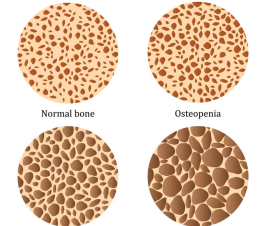Node Smith, ND
A recent study has shown for the first time that probiotics can have a positive effect on bone health. The research, conducted at the University of Gothenburg, Sweden has demonstrated that taking a dietary supplement with probiotics was associated with a 50 percent reduction in bone loss compared to women receiving placebo.
Osteoporosis is a growing concern
Osteoporosis, the loss of bone mineral density, is a growing concern as individuals age, especially women. As weight bearing exercise decreases later in life, coupled by a common trend of inadequate nutrition, the elderly become increasingly susceptible to developing weak and brittle bones. It is estimated that a majority of women over 80 years of age have osteoporosis of varying degrees. In addition, some medications, like corticosteroid drugs can have the common side effect of osteoporosis at young ages.
Many would rather have other options
There are medications that are given for osteoporosis, but many people would rather have other options. In addition, many individuals are not aware that there is a problem with their bone health until after they have sustained a fracture. If there is an easy way to prevent bone loss so these fractures never happen, it would be a wonderful preventative measure.
The Study
The actual study, facilitated at Sahlgrenska University Hospital in Mölndal, Sweden, looked at 90 women, with an average age of 76 years. The women either took a probiotic powder or a placebo every day for a year. The active treatment contained the bacteria Lactobacillus reuteri 6475. The study was a double-blind, randomly assigned trial, and the results are published in the Journal of Internal Medicine.
The Findings
Bone loss was measured in the lower legs of study participants at the beginning of the study, and after a year. The findings were that women who received the active powder lost only half as much bone as participants taking the placebo. The treatment was well tolerated, and produced no differences in side effects between the two groups.
Probiotics shown to affect skeleton density in mice
Probiotics have been shown to affect skeleton density in mice, however this is the first study to confirm such findings in humans.
Source:
- Nilsson AG, Sundh D, Bäckhed F, et al. Lactobacillus reuteri reduces bone loss in older women with low bone mineral density – a randomized, placebo‐controlled, double‐blind, clinical trial. JIM; 21 June 2018. https://doi.org/10.1111/joim.12805
Image Copyright: <a href=’https://www.123rf.com/profile_stockbroker’>stockbroker / 123RF Stock Photo</a>
 Node Smith, ND, is a naturopathic physician in Portland, OR and associate editor for NDNR. He has been instrumental in maintaining a firm connection to the philosophy and heritage of naturopathic medicine among the next generation of docs. He helped found the first multi-generational experiential retreat, which brings elders, alumni, and students together for a weekend camp-out where naturopathic medicine and medical philosophy are experienced in nature. Four years ago he helped found the non-profit, Association for Naturopathic ReVitalization (ANR), for which he serves as the board chairman. ANR has a mission to inspire health practitioners to embody the naturopathic principles through experiential education. Node also has a firm belief that the next era of naturopathic medicine will see a resurgence of in-patient facilities which use fasting, earthing, hydrotherapy and homeopathy to bring people back from chronic diseases of modern living; he is involved in numerous conversations and projects to bring about this vision.
Node Smith, ND, is a naturopathic physician in Portland, OR and associate editor for NDNR. He has been instrumental in maintaining a firm connection to the philosophy and heritage of naturopathic medicine among the next generation of docs. He helped found the first multi-generational experiential retreat, which brings elders, alumni, and students together for a weekend camp-out where naturopathic medicine and medical philosophy are experienced in nature. Four years ago he helped found the non-profit, Association for Naturopathic ReVitalization (ANR), for which he serves as the board chairman. ANR has a mission to inspire health practitioners to embody the naturopathic principles through experiential education. Node also has a firm belief that the next era of naturopathic medicine will see a resurgence of in-patient facilities which use fasting, earthing, hydrotherapy and homeopathy to bring people back from chronic diseases of modern living; he is involved in numerous conversations and projects to bring about this vision.

















